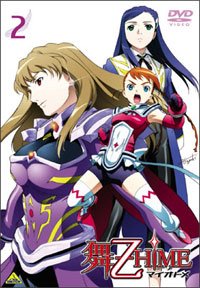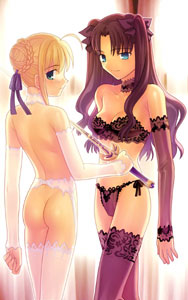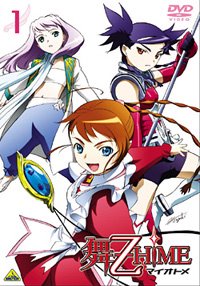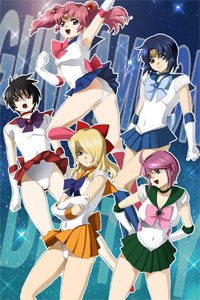Mai Otome: The Rambling Essay Pt. 2

Welcome to Part 2 of Mai Otome: the Rambling Essay. Though Zyl seems to think I should give it a more academic sounding name. His suggestion: A Speculative History of Earl’s Politics, Technology and the Otome System. Honestly though, I'm not sure this should be taken any more seriously than, say, your typical "zOMGWTFBBQ, SHIZNAT YURI FTW!!!!!!11111one", simply because I'm not a scholar of any sort. (Though I play one on TV.;) You can find my first post on the subject: here.
***NOTE: Part 2 includes information from all the currently aired episodes, including 15. Information from the last two episodes seems to suggest that perhaps the Otome system was imported during the migration, but I don't think that alters my reasoning or arguments against the system, just the timeline of events, if it turns out be true.***
Getting back to the discussion: after seeing, potentially, how Earl came to be prior to the start of the series, we can now start discussing events in the individual episodes and how they relate to the 'big picture." While, ultimately, MO is a coming of age story centering around Arika, Nina and Mashiro, it is also a story of tyranny vs. freedom. (No, really, I'm serious.) The Otome system is, by it's very nature, oppressive, both on a human and global scale, as we have seen in the show and as I have argued in my first post. And since oppressive regimes are eventually toppled, I expect the Otome system, as we know it, will be toppled as well. (I'm aware that, historically, oppressive regimes were usually replaced by other repressive regimes, but there seems to be a trend in latter half of the 20th Century toward to more free markets and free societies. And, I'm just projecting that trend here. It's empirical evidence of social evolution.)
So, we begin MO with an attack on Windbloom castle 14 years ago. Schwarz and their Slaves are there as well as the Aswald Knights. But, several mysteries still surround this incident, chief among these is: Why?
We know from the episodes that Rena, Windbloom's Otome, had retired and had baby, thus Windbloom's defenses were severely weakened, providing an opportunity to stage such an attack. If it's a sneak attack, which it appears likely, the first line of defense is ordinary soldiers which don't seem to match up well against either the Slaves or the Aswald cyborgs.
Guarderobe would, naturally, be slow to respond because of the 3 member approval requirement for all actions within a sovereign nation. It's probably safe to say that by the time Guarderobe could act, it would have already been too late.
But, we're still left with: Why? Why did they attack Windbloom castle? Empirical evidence from the episodes suggests that Schwarz and Aswald may have been interested in the royal child, and perhaps Rena's child. (I have long suspected that there may have been more than one child at Windbloom castle that night, and the old lady in 14 and 15 seems to have confirmed that.) Though, we could also say that Aswald's interest, Rad's in particular, might have been on Rena, but probably was more focused on the Harmonium.
I think we can infer that both Aswald and Schwarz knew of the Harmonium's existence and it's purpose, especially as both of their operating philosophies depend on despising and changing the way the world is now. In which case, both groups know of it's requirements: the Song/Singer, the Player, and the Protector.
Here we can surmise either a possible genetic requirement, a gender requirement, or some combination of the two. Any of one of these could explain the reason why Windbloom was attacked 14 years ago and why finding the "real princess" is key to Nagi's, Schwarz' and possibly Aswald's future plans.
I had up until now, believed that the search for the "real princess" was a red herring, given that I couldn't imagine how the search for the "true" princess would be of impact, since it's more than likely that Mashiro would remain Queen at the end of the series. But, if we surmise that a genetic (Fumi's master's descendant, perhaps?) or gender component is also needed for the activation of the Harmonium then the matter of finding the "true" princess takes on added weight. (It also explains why the Harmonium opened when Arika stepped up to it and partially activated when Mashiro hit a note, it recognized one or both as having the necessary qualifications.)
Speculation about the Harmonium centers on needing of 3 people, potentially, to activate it, but obviously it cannot be just any 3 people, or else why would the "true" princess have been targeted. And just on the empirical evidence, it would seem to suggest that one of the requirements for the Harmonium is the "true" princess, which implies the gender component I mentioned early may have been the deciding factor.
If Schwarz or Aswald knew about the requirements prior to the attack on Windbloom, why wait to move on that information if one of the necessary people was a Windbloom royal? No, clearly the birth of the a princess was prodigious for a number of reasons.
As a side note, I have been wondering if, indeed, 3 people are needed for the Harmonium's activation, certainly the evidence seems to suggest that, but still. . . . If I have surmised the Harmonium's function and Fumi and her Master's role correctly in Part 1, then who was the necessary 3rd person in the original scenario? And why are they and Fumi's master unknown. Given that SUNRISE has made Nina, Arika and Mashiro the main trio, much like Mai, Mikoto and Natsuki were the main trio in MH, it is not unrealistic to think that the ultimate resolution will depend on the relationship between two of the main trio, not all 3. (The relationship between Mai and Mikoto was key in MH.) But, unless we learn something in subsequent episodes I will take the 3 part requirement at face value.
Getting back on track: Having established that the "true" princess is, in fact, necessary for the Harmonium's activation then this gives weight to Nagi's assertion that controlling her, means controlling the world. Hence, a possible rationale for Rena's bait and switch with her own daughter. In this scenario, the need to protect the princess and her potential destiny may have overridden Rena's natural instincts to protect her own daughter first. (Loyalty and duty over self.)
But, it doesn't appear to have been a very effective bait and switch since Aswald seemed to target in on Rena as having what they sought. And here is where it can get confusing. ;) Having Rena protect the baby princess in the casket only makes sense if there was no baby switching, since the casket and Rena's protection of it mark it as being Very Important. So, if the intent was to mislead their pursuers then that should not have not been the princess in the casket Rena protected.
If we are to believe the old, dying retainer in eps. 14 and 15, then we can surmise that it was never their intention to mislead their pursuers. Instead they were solely focused on protecting the heir to Windbloom and key to the Harmonium. In which case, Mashiro may indeed be Rena's daughter raised as the princess when the "true" princess could not be found. And it may have been that the old retainer found herself in the slums, as someone who might have known the true identity of the baby, she could not be kept around, but had enough sense to avoid being "silenced."
But, this does not address why Rena gives the Souten no Seigyouku to, presumably, the princess. I think it makes a little more sense, given what we know of the Otome system, to give the GEM of a Meister to someone who may become a future Master, rather than someone who could become a future Meister. But, it may be more complex than that. If we suppose that the current speculation surrounding the Souten no Seigyouku is true, it is linked to both the Harmonium and the Blue Star in the sky, and that star may or may not be the Arc or Colony ship that transported their ancestors to this planet, then Aswald's presence at Windbloom 14 years ago becomes a little more justifiable.
In this scenario, Aswald is pursuing Rena for the Souten no Seigyouku and it's link to the original Colony Ship, as that would fulfill their desire to return to the stars and the technology available to their ancestors. Though, we also cannot overlook that Aswald may have just wanted to get their hands on a Meister GEM to reverse engineer it.
But, what if the Souten no Seigyouku is also a determining factor in the Harmonium requirements? The protector is frequently mentioned and the Souten no Seigyouku was in Arika's possession when they approached it for the first time. So, let's suppose it is a combination of these things: that one of the three requirements, the song/singer, the player, and the protector, has to be a female Windbloom heir, and another must be the Master/Otome contract using the Souten no Seigyouku. In this case, while Aswald and Schwarz joined forces for the attack they may have had dissimilar goals once the attack was under way. Each after a different part of the requirements for their own reasons.
If we presume that Rena's intention was to safeguard the princess and the GEM by whisking them away, then it may have also been her intention to do so personally. That may have been her final duty and why she entrusted the care of her own child to someone else. She may have sent the princess downstream with the intent of locating her once she evaded their pursuers, but it did not come to pass and the baby ended up in the care of Arika's baa-chan, hence the misunderstanding of the intent of having the baby with the GEM. (Arika's belief that her mother was an Otome.)
If we take my original theory that Mashiro has always been the true heir to Windbloom then I don't think much of the above changes, other than some intentions on the part of Rena of whom to safeguard and why. Schwarz and Aswald's motivations still hold, and we still end up in the same place 14 years later. In the interest of fairness, let's also discuss the possibility that Nina may be the "true" princess. At this point, the evidence for such is one scene in Episode 8 right before the eyecatch. An indistinct vision of an older woman, who could be Rena.
At this point, with the old lady's deathbed confession, this possibility is looking extremely unlikely, though it may be entirely possible that Nina may be Rena's daughter, since we still would not know whether Mashiro was indeed the other baby given to the old lady's friend. Though, being Rena's daughter would fulfill the "hate for the mother" aspect of Nina's Electra complex, quite nicely. ;)
Ultimately, I think this series will resolve with the conditions imposed by the Otome system being lifted, specifically the restrictions on the technology and knowledge, and the Harmonium is obviously key to that. What's left is: how do we get there?
We know that while there hasn't been a war between Otome in 50 years, but things are not peaceful or idyllic, as much of the tension and their underlying causes have not been alleviated, as evidenced by King Argoss' and Nagi's scheming and Romulus and Remus' Otome battling without an investigation or parlay.
And while Otome are not supposed to be considered weapons, but rather peacekeepers, possession of an Otome is politically similar to having nuclear weapons in our world. The point of having them is not so much using them, but rather being able to threaten to use them. This requires everyone to realize that the use of a weapon is too horrible to contemplate, but again, this presumes rational, reasonable, sane behavior. Very dicey that.
So, what will happen that might lead to throwing off the Otome shackles? Let's look at some of the factions present, and see where that takes us. Aswald and Schwarz are the obvious external enemies, each wanting to change the world for good or ill. Next, comes the 12 kingdoms themselves, including Nagi, each seemingly to use the system while looking for ways to increase their own power, stature and influence. And we have the internal factions from Guarderobe and Windbloom, Arika and her desire for no more war, Mashiro and her desire make everyone happy as Queen. Each of these will bring pressure to bear on the status quo, and faced with a multi-front attack, even the most formidable of fortifications will eventually fall.
It has already started actually, in 15, with Schwarz using their new Slaves to exacerbate and entice two countries with a long history of mutual dislike into a skirmish. While Natsuki and Guarderobe are distracted by the international tensions, an attack on Guarderobe would come next. (Which seems to be supported by future episode spoilers) Aswald seems to have some peripheral connection to Schwarz, either through espionage or a more direct connection, (an agent or sympathizer), so like the incident 14 years ago they might seize the opportunity to pursue their own ends in such a situation. And in the ensuing chaos, the next step is the manipulation of our 3 main characters into activating the Harmonium.
If the Harmonium was used as I surmised, then the fact that it was used to stop wars before would be enough incentive to get our trio to reactivate it. But, the key difference is that none of the new users would understand it properly, or else they would be given the wrong instructions and not know any better. Thus, the reshaping of the world.
At this point, I'm going to end this post, since I'm now at a spot where I have to address most of the major plot points in the episode one at a time, and try to keep up with the new information as it comes out week by week. So, stayed tuned for Part 3 for more run of the mill speculation as we go along.









